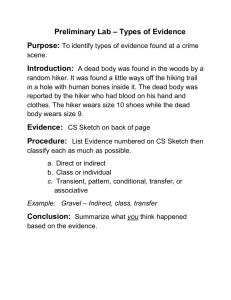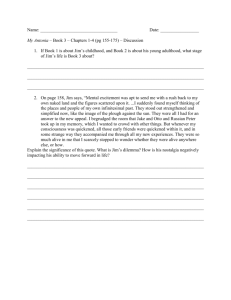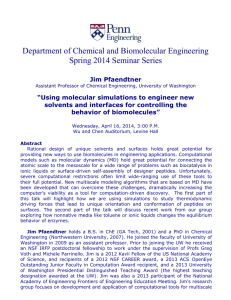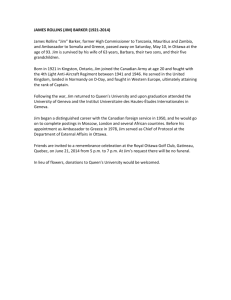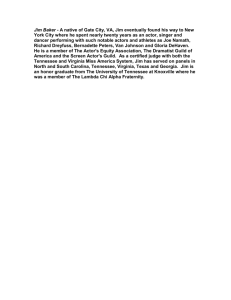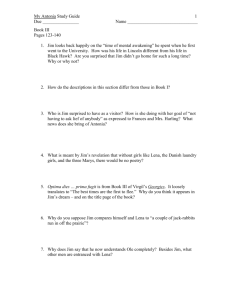Ex. 41 PowerPoint
advertisement
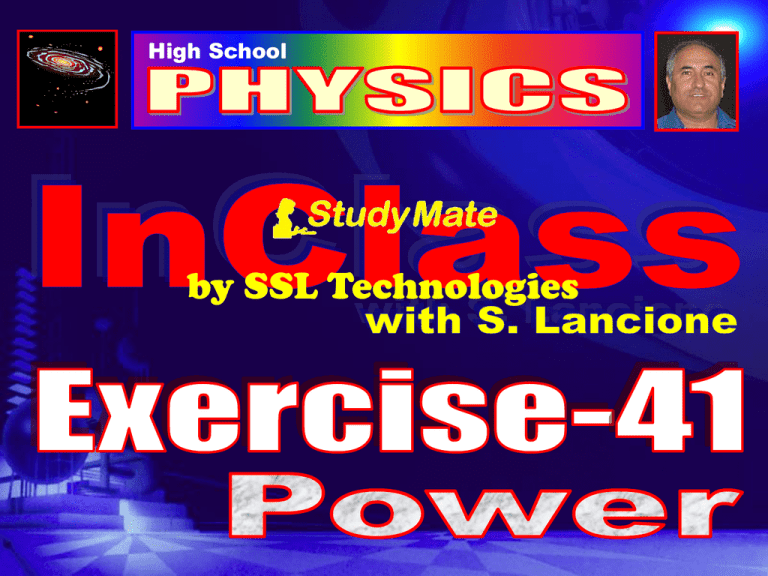
High School by SSL Technologies Physics Ex-41 As you know, work is the product of force times the distance through which the force acts (W = Fs). For example, consider a force of 10 N acting through a distance of 10 m. The work done is 100 J. This is true if the work is done in one second, one hour or one year. That is, the formula for work does not take into account the time it takes to do the work. The concept of power includes the time required to do the work. Click Physics Ex-41 Power is the rate of doing work. It tells us how fast work is being done. Power is important in order to establish the “speed” with which a given force acts. The formula for power is: Velocity Where: P = power in watts (W) F = force in newtons (N) t = time in seconds (s) v = velocity in m/s Click 2 m/s Use g = 10 for the Earth’s gravitational acceleration. Click Question-1 Physics Ex-41 Jim slides a box along a floor a distance of 10 m by applying a force of 50 N horizontally in a time of 5 s. Tim also slides a box along a floor a distance of 10 m by applying a horizontal force of 50 N but in a time of 10 s. Determine: a) How much work did Jim do? W = FAs = (50 N)(10 m) = 500 J b) How much work did Tim do? W = FAs = (50 N)(10 m) = 500 J c) Who did more work? Both did equal work (500 J each) d) What power was developed by Jim? P = W/t = (500 J) / 5 s = 100 W e) What power was developed by Tim? P = W/t = (500 J) / 10 s = 50 W f) Who is more efficient? g) What becomes of the work done by Jim and Tim? Jim is more efficient. Lost as heat and sound energy Click Question-2 Physics Ex-41 Is power a scalar or a vector quantity? Power is a scalar as it has no direction. Click Question-3 Physics Ex-41 (Length, Mass and Time) In terms of basic units (L, M and T), what are the dimensions of power? Click Physics Ex-41 Question-4 A 20 kg object is pushed 15 m along a horizontal frictionless surface by a horizontal force of 8 N. If the work was done in a time of 12 s, calculate: a) The work done. b) The power output. 120 J 10 W c) What becomes of the work done? It is lost to overcome friction (in the form of heat and sound) Click Physics Ex-41 Question-5 It takes a 70 kg man 20 s to walk up to the third floor of a building. If the vertical height he climbs is 12 m, determine: a) The work done by the man. 8 400 J b) The rate of doing work. 420 W c) What becomes of the work done? It is gained by the man in the form of potential energy. Click Question-6 Physics Ex-41 What power is required to raise a mass of 40 kg a distance of 5 m in a time of 2 s? Click Question-7 Physics Ex-41 A water pump raises 30 liters of water per minute from a depth of 100 meters. What wattage is expended? Click Physics Ex-41 Question-8 Stefania pulls a wagon at constant speed along a level street. She exerts a force of 150 N by pulling on the handle of the wagon at an angle of 40o from the ground. If the time it takes Stefania to pull the wagon 120 m is 3 minutes, determine: a) The force to overcome friction. b) The work done. c) The power output. 115 N 13 800 J 77 W d) What becomes of the work done? It is gained by the man in the form of potential energy. Click Question-9 Physics Ex-41 If 700 W of power is needed to keep a boat moving through water at a constant speed of 10 m/s, what is the magnitude of the force exerted by the motor of the boat? Click Question-10 Physics Ex-41 How much work does a 400 watt fan motor do in 15 minutes? Click Physics Ex-41 Question-11 A 2 000 kg elevator is raised a distance of 18 m in a time of 40 s. Determine: a) The work done. 3.6 x 105 J b) The rate of doing work. 9 x 103 W c) What becomes of the work done? It is gained by the elevator in the form of potential energy. Click Physics Ex-41 Question-12 A 600 N hiker carries a 20 kg nap-sack up a trail. After 30 minutes, he is 300 m higher than his starting point. Calculate the following: a) The weight of the nap-sack. 2 x 102 N b) The work done on the nap sack. 6 x 104 J c) The work done by the hiker. 2.4 x 105 J d) The power output of the hiker. 2.4 x 105 J Click SSLTechnologies.com/science

